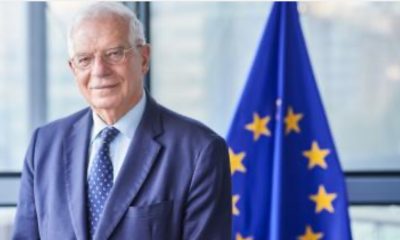אַזערביידזשאַן
די נצחון פון אַזערביידזשאַן אין נאַגאָרנאָ-קאַראַבאַך קריייץ פּלאַץ פֿאַר פארבליבן אי.יו. השפּעה אין דער געגנט

On November 8th 2020, as Azerbaijani troops entered the strategically important town of Susha, after a fierce three-day battle, Nikol Vovayi Pashinyan, prime minister of Armenia and instigator of the aggression in Nagorno-Karabakh, would have realised that he had met his Waterloo. The issue of Nagorno-Karabakh, Azerbaijani territory populated and governed mostly by ethnic Armenians, has been probably the one issue that has united the global Armenian diaspora. Instead of delivering his people a region, Pashinyan handed them a crippling military defeat. - writes Phillipe Jeune.
Whether he, or the man widely considered to be little more than Pashinyan’s puppet, President Armen Sarkissian, can survive politically has yet to be seen, although the prime minister himself is expected to do whatever he can to cling to power. However, thanks to his belligerence, and the asymmetrical relationship that his country enjoys with Russia, he may no longer be the master of his own fate.
Pashinyan’s actions, ill-advised, reckless, and costly, have led to a geo-political shift in the region.
The prompt arrival of Russian troops under the guise of “peacekeepers”, within hours of the Armenian capitulation, will present a challenge to the European Union which, whilst not being existential as such, certainly sees the bloc losing influence in the region. Possibly an obsession with “dealing with” Turkey, and an inherent inertia that sees it outmanoeuvred and outpaced by the Kremlin time and time again, has led to a certain dysfunctionalism in EU regional policy in this case.
President of Azerbaijan Ilham Aliyev, whose handling of the conflict has seen his political capital rise considerably at home and abroad, oversaw the agreement whereby Turkey, Azerbaijan’s strongest ally, would deploy a small force to the contested region to add balance, and to reassure his own people.
This move was immediately attacked by French president Emmanuel Macron, whose country is home to one of the largest Armenian communities in Europe - as many as 600,000 ethnic Armenians are believed to live in France - and he has faced criticism from that community that he did not do enough to help Yerevan.
France, along with Russia and the United States, jointly chairs the Organization for Security and Co-operation in Europe (OSCE) Minsk Group, formed to mediate the conflict, but without any tangible signs of success having been achieved over the last three decades.
Macron’s domestic political concerns should not blind the EU to the importance of its role maintaining peace and stability in the troubled region, and its otherwise healthy relationship with Baku.
Instead of turning a blind eye towards Russia’s influence over Armenia the EU might consider addressing the belligerence of the Pashinyan regime, which in fact may be the result of Russian string-pulling, by imposing sanctions as it has done with Russia, Syria, Belarus, and certain Ukrainian officials and oligarchs.
The conflict in Nagorno-Karabakh saw Armenian forces burning homes and forests, as well as houses built by Azerbaijani people in Kalbajar who in 1993 were expelled: people who lived in the hope of one day returning to those homes. The EU, and the political groups in particular should not remain silent about these crimes.
Concerns are being expressed in Baku and elsewhere that having served his purpose Pashinyan’s departure, which could take place as early as December, will herald the installation of a pro-Kremlin puppet government.
The EU should have no doubts that Vladimir Putin is choreographing events in the Balkans, just as he has done in Syria, in the Caucus, in eastern Ukraine, and, in the opinion of many observers, in Belarus.
Azerbaijan has shown resolve in the face of aggression, and magnanimity in victory: ensuring the security and integrity of the country remains is also the best and possibly the only chance that Brussels has to maintain its influence in the region.
All opinions expressed in the above article are those of the author alone, and do not reflect any opinions on the part of EU Reporter.
שער דעם אַרטיקל:
-

 קאָנפערענסעסקסנומקס טעג צוריק
קאָנפערענסעסקסנומקס טעג צוריקNatCon ס אָנ-אַוועק זיצונג סטאַפּט דורך בריסל פּאָליצייַ
-

 מאַסע סערוויילאַנסקסנומקס טעג צוריק
מאַסע סערוויילאַנסקסנומקס טעג צוריקרינען: אי.יו. ינלענדיש מיניסטערס ווילן צו באַפרייַען זיך פון שמועס קאָנטראָל פאַרנעם סקאַנינג פון פּריוואַט אַרטיקלען
-

 קאָנפערענסעסקסנומקס טעג צוריק
קאָנפערענסעסקסנומקס טעג צוריקNatCon זיצונג צו גיין פאָרויס אין נייַ בריסל וועניו
-

 אייראפעישער עקסטערן קאַמף סערוויס (EAAS)קסנומקס טעג צוריק
אייראפעישער עקסטערן קאַמף סערוויס (EAAS)קסנומקס טעג צוריקבאָררעלל שרייבט זיין אַרבעט באַשרייַבונג

























